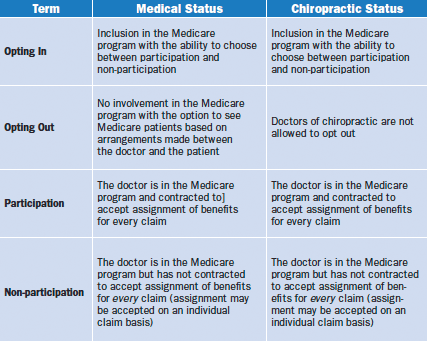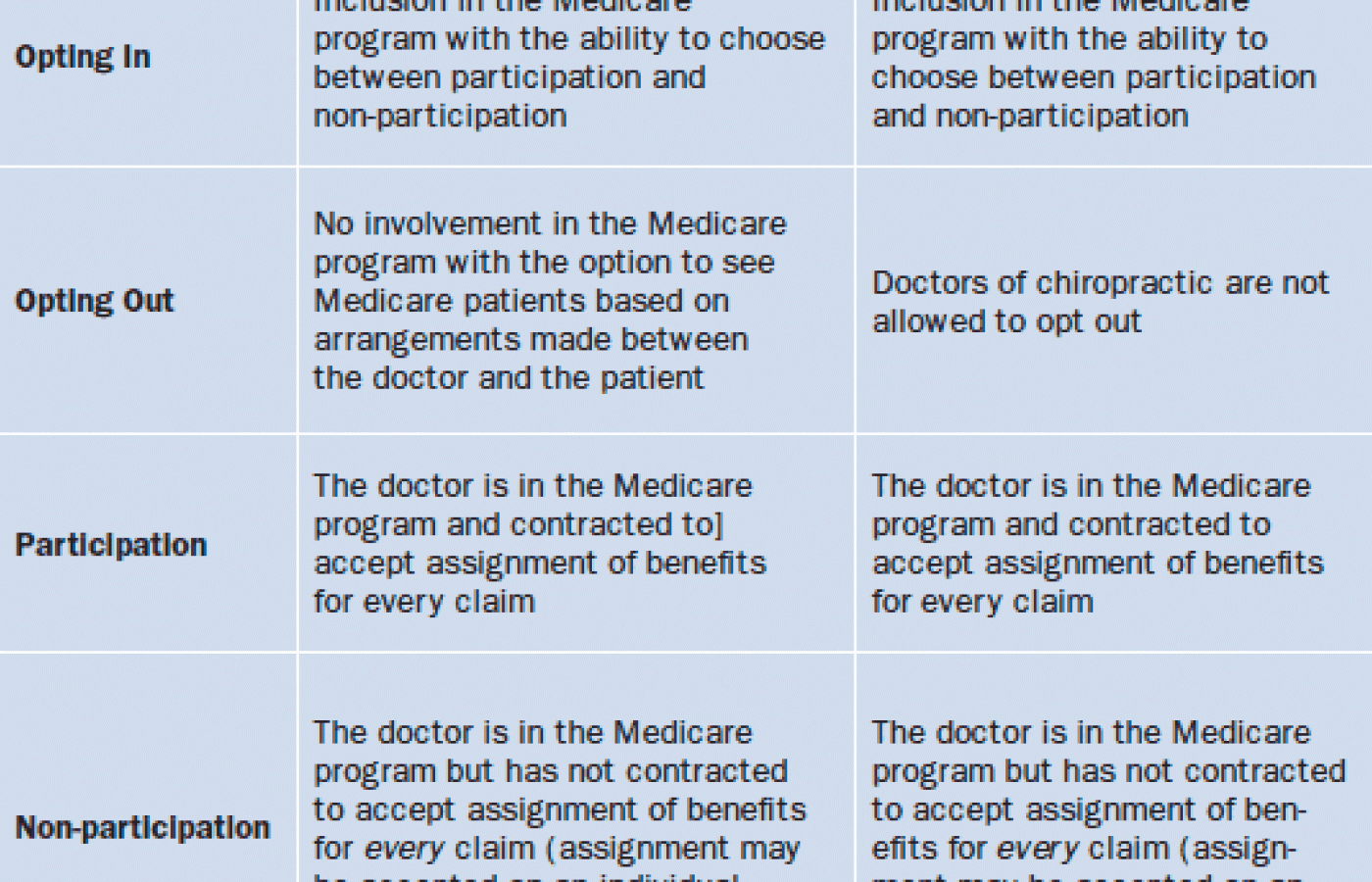It’s a new year and many chiropractors are evaluating what will enhance their respective practices, particularly as it relates to their bottom line. One of the most common questions I get is: “Do I need to be credentialed to bill insurance, and what are the best plans to join?” It’s a loaded question – but one every DC ponders. Whether you're already in-network or pondering whether to join, here's what you need to know.
Weighing Your Medicare Options
We are all familiar with the terms participation and non-participation. In the major medical world, participation means you are a contracted provider and automatically accept assignment of benefits. Non-participation means you are not a contracted provider and are outside the carrier's plan or system. Assignment can only be obtained for a non-participating provider if the patient has out of network benefits and the provider will pay directly to a non-participating provider. If the doctor does not participate and there are no out of network benefits, the doctor is free to treat the patient on his own terms.
In the Medicare world, participation and non-participation both apply primarily to the contracted provider. The terms do not equate with being in or out of the Medicare system. The terms for being in or out of the Medicare system are "opting in" and "opting out", not participation and non-participation. In Medicare participation equates with accepting assignment and non-participation equates with not accepting assignment.
To further define opting in and out: If a medical doctor operates within the Medicare system he must follow Medicare rules and can choose to participate or not participate. If a medical doctor chooses to opt out of the Medicare program, he signs an affidavit saying he chooses to opt out.From that point the doctor must notify his patients that he is not participating in Medicare and work out payment arrangements with those patients who choose to continue or initiate care.
The doctor is given the opportunity to opt back in later if he chooses.
Doctors of chiropractic who opt in to Medicare have to follow Medicare rules and can chose to participate (accept assignment) or not participate (not accept assignment).
Doctors of chiropractic cannot opt out of Medicare. Opting out is illegal for doctors of chiropractic. The same applies for physical therapists. A chiropractor's only legal way out of the Medicare system is to simply never see any Medicare qualified patients. It is an all or nothing deal.
It is not uncommon to find doctors of chiropractic that have opted out by their own method. Some claim they just charge Medicare patients what they feel like; some say they use the old "donation box" fee structure, and some claim they are going to start using one of these two systems of payment. This is against federal law.
The doctors say, "It is MY practice! I should be able to do what I want! I will do what I want!"I understand their point and frustration. However, we must all come to realize that while our names are on the diplomas, licenses, debt, deeds and other aspect of our practices, it does not make us the rule makers in third party payment systems. Especially those run by the government.
Many of these same doctors will state that they have been doing things their way for a long time and, never had a problem. This often gives them an air of confidence.They aren't worried. They'll deal with it if something happens. They will even recommend that other doctors follow their lead.
The reality is some of these doctors will reach retirement without their methods backfiring. This isn't absolution. It just means they were not caught. It must be stated, just because someone isn't taught breaking the law it doesn't mean they are in the right or innocent. If they speed while driving home tonight without getting a ticket, they still broke the law. That may be an oversimplification but, this is true for all levels of the law.
The "I'll do it my way" method is very risky. The decision is a conscious one. Knowingly and willfully doing things the wrong way in third party payment systems is typically considered fraud. This can carry penalties beyond simply refunding the money. In the Medicare system the penalties are substantial.
There is no statute of limitation on fraud committed against the federal government. They can investigate a doctor for the possibility of fraud for any year or time period. If they prove fraud they are allowed to recover up to three times the money taken through the fraudulent act. This is accompanied by fines per visit that can be in the thousands of dollars.That is "per visit" and not per case.They may then peruse payment of interest and investigative/court costs.
The government's response to Medicare violations is intended to be harsh. Their actions are intended to set an example and be a detourant to fraud in health care.
Are some of the Medicare rules unfair? Do they interrupt the flow of day to day practice? Do they create a system that is much more complicated than it needs to be? Absolutely! But we have to abide by them. They are federal laws.
One of the best ways to deal with the frustrations of the Medicare system is to study it. Knowledge is powerful here. Even though the system is flawed, "owning the system" can improve your outlook on the situation.
Table 1: Definitions and Requirements for Medical and Chiropractic Doctors in the Medicare Program Term Medical Status Chiropractic Status

General Reference
- Medicare Benefit Policy Manual, Chapter 15, Covered Medical and Other Health Services. Published by the Center for Medicare and Medicaid Services, available on line at www.cms.gov.



